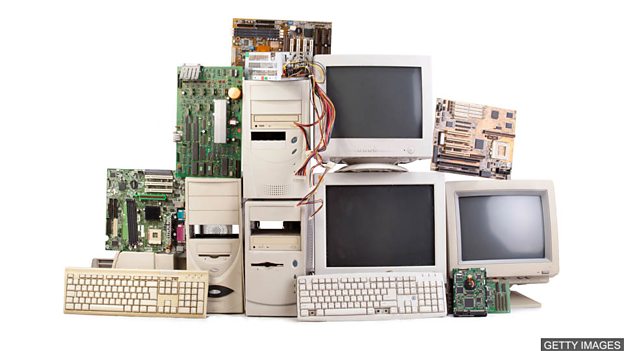随身英语
Solving the problem of e-waste 电子垃圾处理的新方法

破坏人类地球环境的问题之一是我们扔掉的东西太多了。各种垃圾堆积在垃圾填埋场里;塑料垃圾污染了我们的海洋与河流。近些年来,在我们扔掉的东西清单上又增加了一项——坏了、无法回收的电子产品。本文介绍一些用来处理电子垃圾问题的新方法。
Vocabulary: waste 词汇:垃圾
One of the problems damaging our planet is the number of things we throw away. Rubbish of all kinds is piling up in landfill and polluting our rivers and oceans. A more recent addition to the list of things we chuck away is e-waste – electronic items that are broken and not recycled. Now solutions are being found to give this stuff a new life.
Many millions of tonnes of televisions, phones, and other electronic equipment are discarded each year, partly because it’s cheaper to replace them than fix them, but also because we lack the skills to repair them. A UN report claims the 50 million tonnes of e-waste generated every year will more than double to 110 million tonnes by 2050, making it the fastest growing waste stream in the world.
However, there’s a growing trend for repair events and clubs which could be part of a solution to the growing amount of electrical and electronic junk. The BBC visited a Restart Project in London, which is one of many found around the world. One of its volunteers, Francesco Calo, said that "this project allows you to reduce waste, extend the life of objects, and it helps people who cannot afford to get rid of items that have developed a fault."
As many electrical items contain valuable metals, another idea is e-waste mining. An experiment at the University of New South Wales involves extracting these materials from electronic gadgets. It’s thought that doing this could be more profitable than traditional mining. With phones typically containing as many as 60 elements, this could be part of the solution to our appetite for new technology.
These projects make total sense - collections of e-waste for recycling are “stagnating or even decreasing” according to Ruediger Kuehr, of the United Nations University. And in countries where there is no legislation, much of it just gets dumped. However, the European Union, for example, is trying to tackle the problem by insisting manufacturers have to make appliances longer-lasting and will have to supply spare parts for machines for up to 10 years.
词汇表
throw away 丢弃,扔掉
rubbish 垃圾
landfill 垃圾填埋场
pollute 污染
e-waste 电子垃圾(废弃的电器和电子产品)
recycled 回收再利用的
discarded 被扔掉
repair 修理
waste stream 废物流
junk 破烂,废弃的东西
extend the life 延长(使用)寿命
get rid 丢弃
fault 故障
extract 提取
recycling 回收利用
stagnating 停滞不前的
legislation 立法
dumped 被乱扔掉
longer-lasting 更耐用的
spare parts 备用配件
测验与练习
1. 阅读课文并回答问题。
1. Give one reason why electronic items are simply thrown away.
2. According to official figures, how much e-waste will be generated by 2050?
3. Which part of electrical items can be ‘mined’ and used again?
4. True or false: We are very hungry for new technology, which is leading to the rise in e-waste.
5. Why, in some countries, does e-waste just get thrown away and not fixed?
2 . 选择意思恰当的单词或词组来完成下列句子。
1. I get so annoyed seeing _______ old crisp packets and burger boxes lying by the side of the road.
stagnating discarded extracting recycling
2. After the party, we spent hours clearing up all the _______.
landfill spare parts rubbish waste stream
3. I’ve got a real _______ for adrenaline sports, so I’m going to take up sky-diving!
appetites appetite apetite appetiting
4. Using some _______ batteries, I can now use my bike lights all winter without having to buy any new ones.
longer-lasting extend the life spare parts recycling
5. Nobody wanted to buy my old sofa, so now it’s just going to get _______.
rubbished stagnated polluted dumped
答案
1. 阅读课文并回答问题。
1. Give one reason why electronic items are simply thrown away.
Because it’s cheaper to replace them than fix them and also because we lack the skills to repair them.
2. According to official figures, how much e-waste will be generated by 2050?
A UN report claims 50 million tonnes of e-waste generated every year will more than double to 110 million tonnes by 2050.
3. Which part of electrical items can be ‘mined’ and used again?
Valuable metals that are found in some electrical items can be mined and used again.
4. True or false: We are very hungry for new technology, which is leading to the rise in e-waste.
True. We have an appetite for new technology.
5. Why, in some countries, does e-waste just get thrown away and not fixed?
In countries where there is no legislation, much of it just gets dumped.
2 . 选择意思恰当的单词或词组来完成下列句子。
1. I get so annoyed seeing discarded old crisp packets and burger boxes lying by the side of the road.
2. After the party, we spent hours clearing up all the rubbish.
3. I’ve got a real appetite for adrenaline sports, so I’m going to take up sky-diving!
4. Using some longer-lasting batteries, I can now use my bike lights all winter without having to buy any new ones.
5. Nobody wanted to buy my old sofa, so now it’s just going to get dumped.



